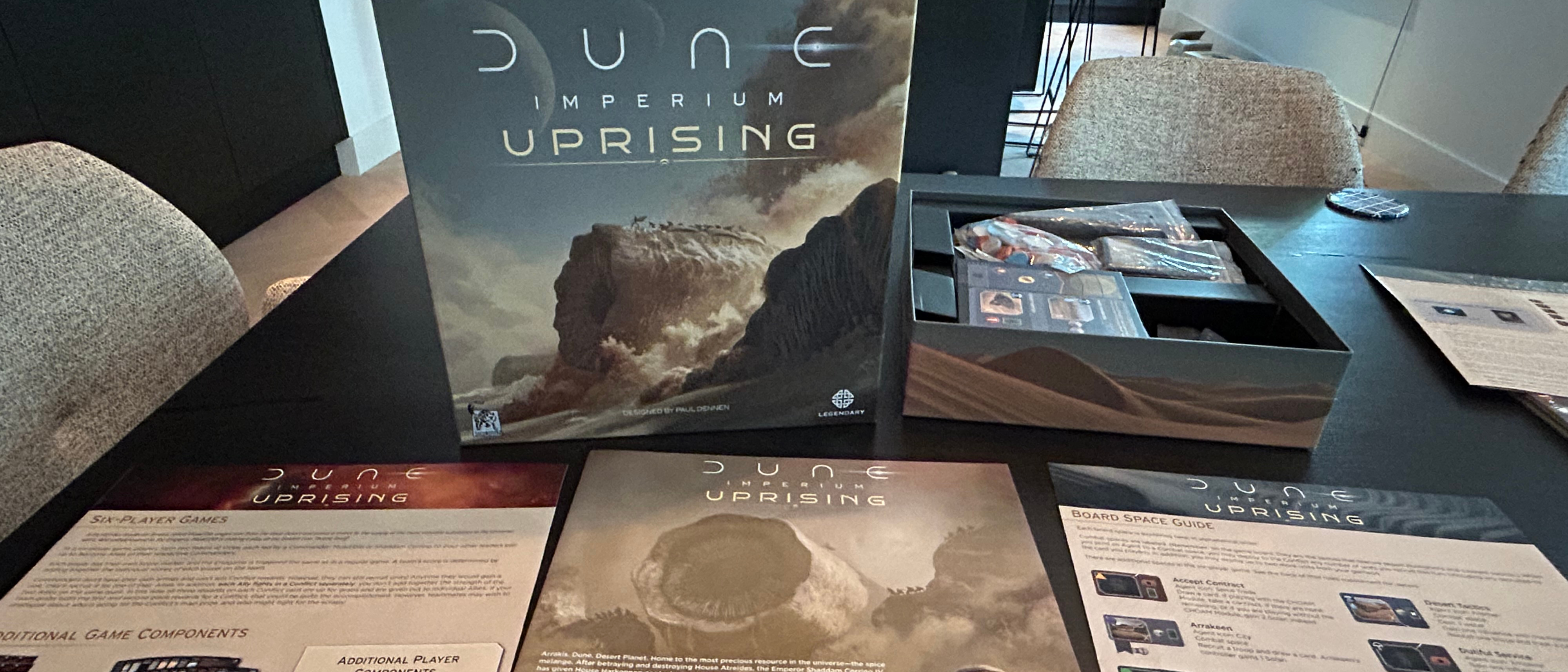GamesRadar+ Verdict
Dune: Imperium - Uprising captures the spirit of the series with high-stakes conflicts, intrigue that can turn the tide of battles, and many complex paths to victory. It’s got an enormous amount of replayability thanks to a deep deck of cards that make every game a bit different, and the dynamic combinations created by the different strategies each leader character favors. Scores tend to be tight, and even when you lose, you feel like you’ve learned something from the experience.
Pros
- +
Excellent art based on the movies
- +
High replayability
- +
Brilliantly blends deckbuilding and worker placement
- +
Comes with a mini-expansion to quickly ramp up complexity
Cons
- -
Some of the characters aren’t well balanced
- -
Not especially satisfying solo or with two players
Why you can trust GamesRadar+
Even though Dune: Imperium - Uprising is a standalone sequel to Paul Dennen’s excellent Dune: Imperium board game, you don't need to have any experience with it to dive in. Focusing on the characters and events of the second Dune movie, this has quickly become the Dune of choice at my gaming table. In fact, it takes what was already one of the best modern board games for adults and improves on that formula.
Much of the characters, art, and even card names tie directly into the film and give you the feel of battling for power and influence on Arrakis through hatching schemes, attracting allies, and leading sandworms into battle. An elegant mix of worker placement and deckbuilding, Dune: Imperium - Uprising has immense replay value, encouraging you to test new strategies each session based on the cards available.
Dune: Imperium - Uprising features & design
| Price | $59.99 / £59.99 |
| Ages | 13+ |
| Genre | Strategy |
| Complexity | Medium |
| Players | 1 - 6 |
| Lasts | 60 - 180mins |
| Designer | Paul Dennen |
| Publisher | Dire Wolf |
| Play if you like | Lost Ruins of Arnak, Expeditions, Dune |
- Gather resources and influence to open up more spaces on the board
- Position spies to ensure you can take the actions you want
- Strategically deploy soldiers and sandworms into battle
Modelled after Dune: Part Two, Uprising takes the deck-building mechanics of 2020's Imperium and spices (no pun intended) them up with added systems, new cards, and a revised board.
There are many paths to victory here, and you’ll need to fight your opponents on multiple fronts to come out ahead. As before, Dune: Imperium - Uprising uses a hybrid of deck building and worker placement mechanics, and much of the strategy comes from figuring out the best use of each of your cards.
Cards have different effects based on when you play them. In order to place an agent on the spaces on the board, you need to play a card that has a matching icon. Some cards also have additional effects when used, which can allow you to use your character’s special ability, gain extra resources, or draw more cards.
Every card also has a second block of text at the bottom which is what it does if it is revealed at the end of the turn rather than being played to deploy an agent. These are mostly used to buy even more powerful cards or provide you a boost in the military conflict that takes place at the end of each round. Like with most deck builders, as the rounds go on you’ll want to try to trash your weak starting cards and replace them with cards that work well with each other and your leader.
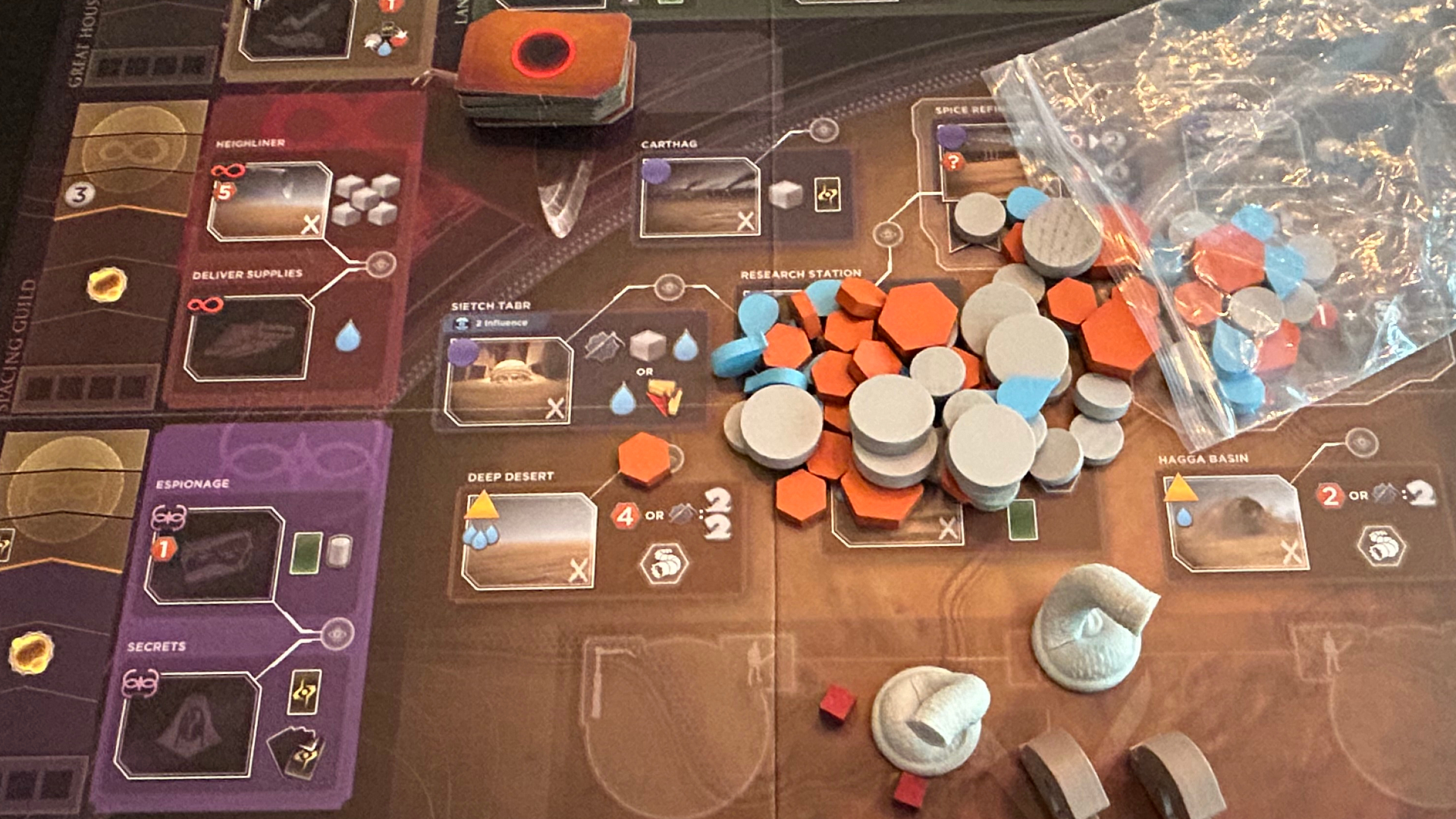
The spaces on the board provide you with key resources like water and spice that are in turn used to pay to visit premium spaces that can offer big rewards like rallying the Sardaukar army or training another agent that gives you an extra play each turn. Some spots also raise your influence with one of Dune’s key factions like the Fremen or the Bene Gesserit – which is one of the primary ways to earn the points needed to win the game.
Each turn also features a conflict, with the rewards getting bigger as the game goes on. Players compete to build armies of soldiers and sandworms, choosing carefully how much resources to commit to any given fight and how much to hold back for future rounds.
Sandworms are hard to deploy – you have to first win the trust of the Fremen and then gather water to venture into the desert to get them – but they’re both more powerful than regular troops and double the rewards of a conflict, meaning they can quickly change the trajectory of the game. The sandworms also look great, intimidating pieces of plastic that tower over the wooden cubes representing standard troops.
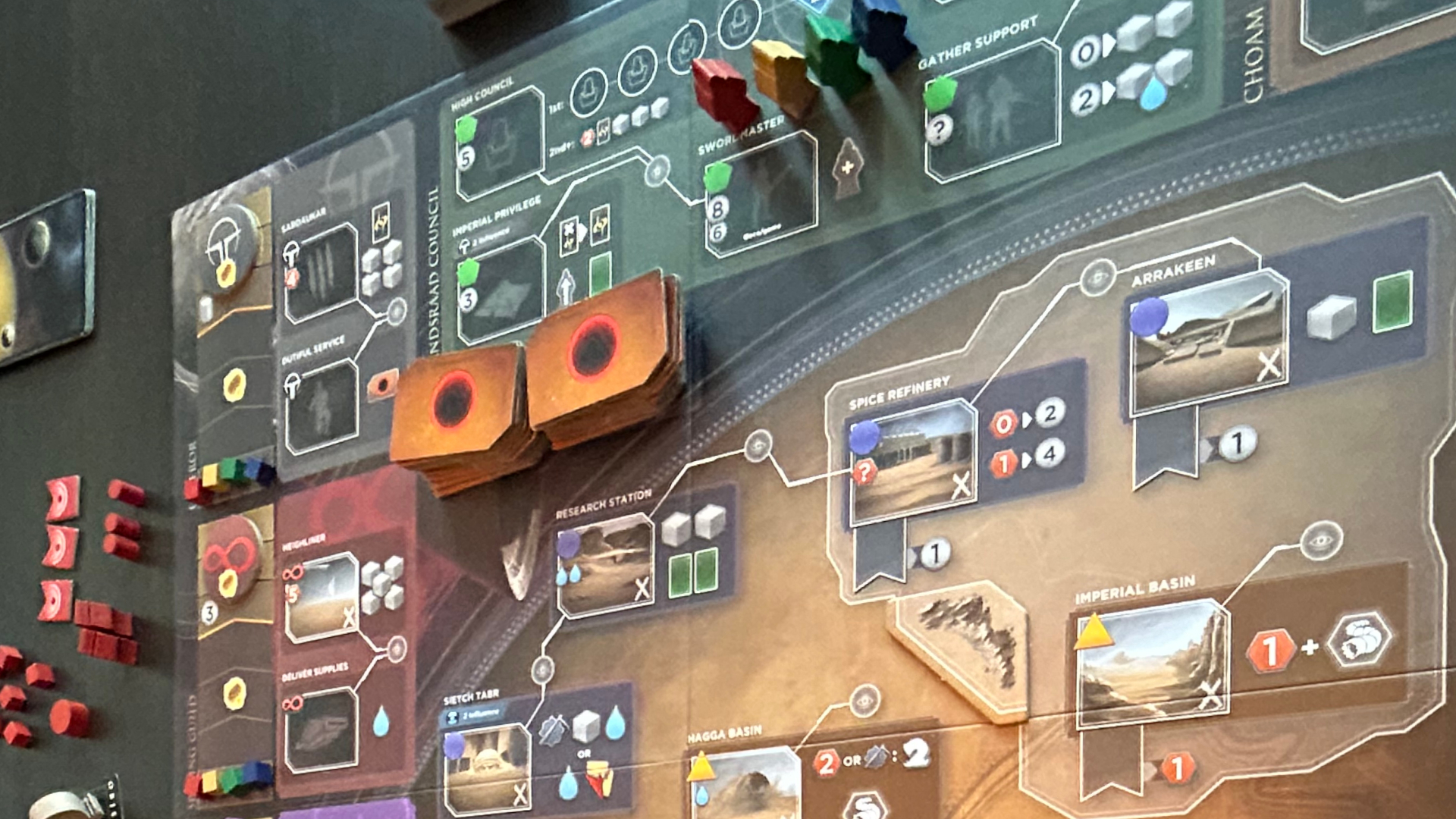
In terms of the difference between Uprising and Imperium, the new game still relies on the original's core mechanics but adds sandworms, contracts, and spies to the mix. The board spaces have also been changed (for the most part, anyway), as have the cards. It's kind of like a new edition.
The tide of battle can also be turned by intrigue cards that are gathered and kept secret. These cards can even provide points at the end of the game so the player who ends the game by earning 10 points first might not actually be victorious if their opponent had a secret scheme.
Dune: Imperium - Uprising also breaks the typical rules of worker placement games, where players block each other from key spaces, through the use of spies. These tokens can be added to certain zones of the game and then recalled to allow you to visit even if another agent is already there. They can also be recalled to draw an extra card or power various other cards and abilities. You’ll need to think carefully about whether to take an immediate reward or ensure you have access to a space in future rounds.
Dune: Imperium - Uprising gameplay
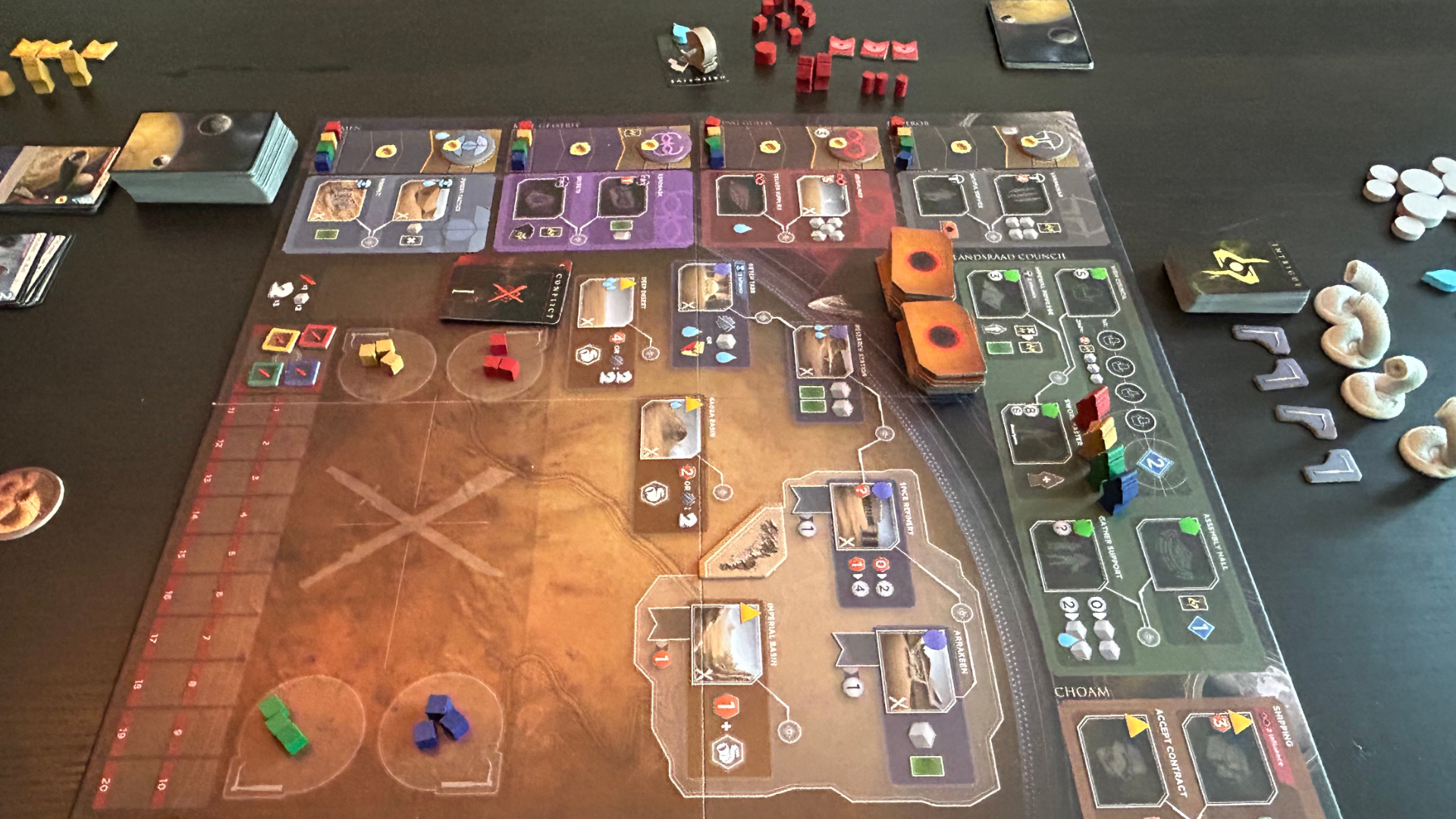
- Best with four players when the board is most crowded
- Six-player team mode can also be fun for experienced players
- Mini expansion encourages advanced planning
Dune: Imperium - Uprising can be played with one or two players using a deck representing an automated opponent, but their actions are so random that they can either run away with a game or basically do nothing. That makes it unsatisfying as a solo experience and too much of a basic head-to-head conflict as a 2-player board game. The game works fine with three players, but it’s at its absolute best with four when there’s the most competition for spaces on the board and each conflict has three prizes, creating a complex calculus for getting the maximum rewards with the minimum investment.
There’s also a six-player team mode where one player takes on the role of Emperor Shaddam Corrino IV and the other plays Paul Muad’Dib, with both working to lead their allies to victory. Rather than directly competing in the conflict or building alliances, they assign the rewards they get on their turns to the players on their side and then pool their points at the end. The leaders also have their own mini boards and special decks. I definitely wouldn’t recommend this mode for new players, but it’s a fun challenge for veterans looking for a more narrative-focused experience.
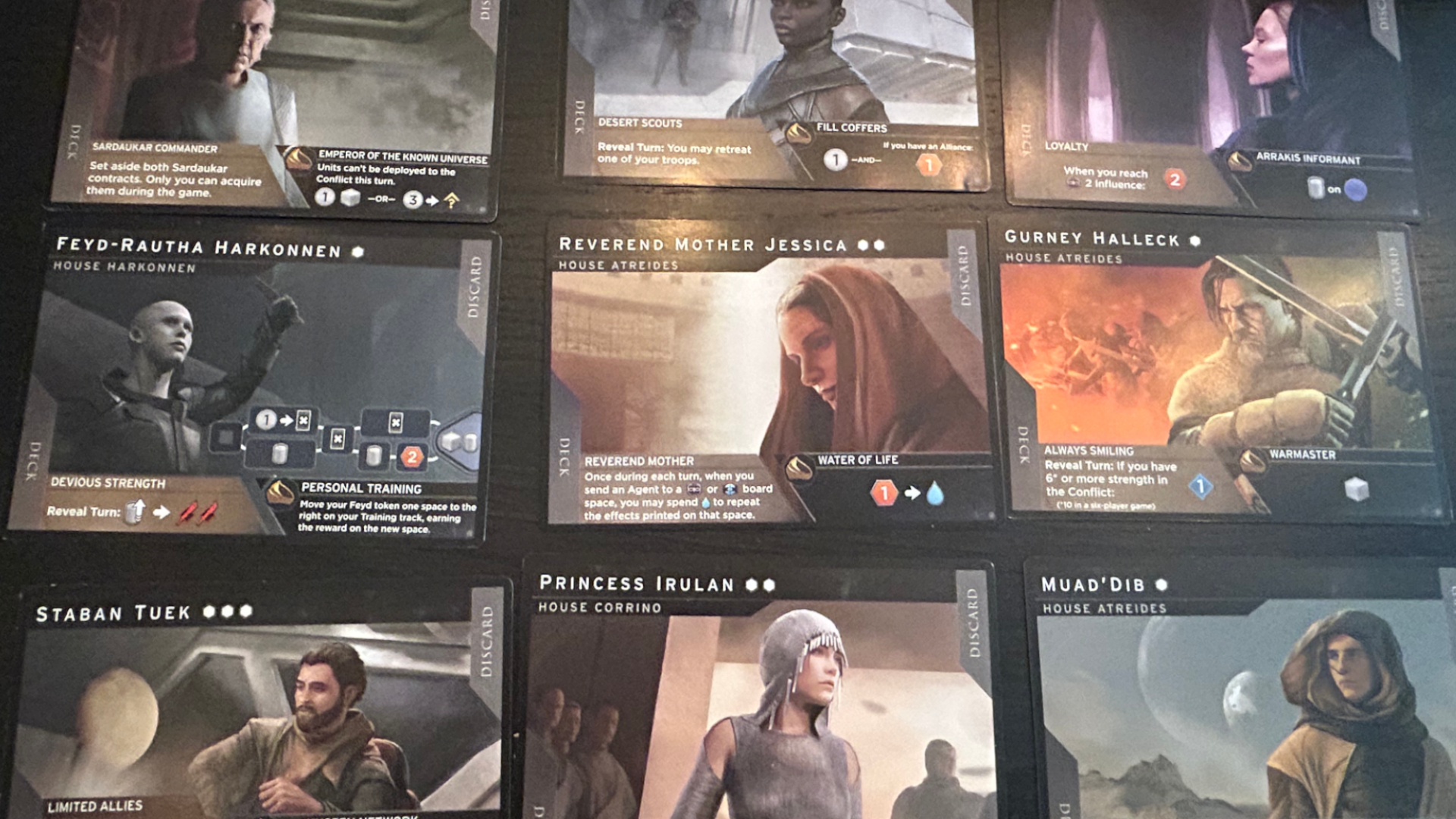
While you can use the Dune: Imperium expansions with Dune: Imperium - Uprising, there are some significant issues integrating cards that don’t work with spies and removing locations that some of the new characters rely on. The game does come with a mini expansion, CHOAM, that I’d recommend playing with immediately. It adds the element of 'contracts,' tiles you collect that give you rewards for going to a specific space on a future turn. While it telegraphs your actions to other players, it rewards planning and adds extra complexity to the game through supporting cards that can give you points for completing contracts or make it easier to pick up new ones.
The huge deck of cards gives Dune: Imperium - Uprising strong replayability because you’ll see different cards each time and have to modify your strategy based on what’s available. Leaders can be randomly doled out or drafted and will also have a major impact on your strategy. Muad’dib favors aggressive sandworm-focused play, while Feyd-Rautha and Princess Irulan are focused on trashing cards to make their decks stronger. While the variety of leaders adds to the replayability, they’re far from balanced. Given the enormous number of characters in Dune it’s also baffling that the designer invented a new one for the game – Lady Amber Metulli – and also made her one of the worst characters in the game.
Should you buy Dune: Imperium - Uprising?

Anyone up for a medium complexity game who enjoyed the Dune films is likely to really appreciate Dune: Imperium - Uprising. It has a huge amount of replayability, allowing players to shift their strategies based on which character they’re playing and how much they want to focus on various factions and victory conditions. It also looks great, especially the sandworms, and does an excellent job at capturing the series’ themes of intrigue, alliance building and high-stakes battles.
In other words? It's amongst the best board games for strategy fans.
Buy it if...
✅ You want a game you can play many times
Uprising has immense replay value thanks to a deep deck of cards and the tactics favored by different leaders.
✅ You like the Dune films
Cards use art and even lines from Denis Villeneuve's Dune: Part Two, making you feel like you’re fighting for dominance of Arrakis.
Don't buy it if...
❌ You don’t enjoy direct confrontation in games
Players will be constantly fighting over resources and directly battling to win conflicts, which makes this more interactive than many worker-placement games.
❌ You primarily play solo or two-player games
While you can play this way, the game really shines with a full four players.
How we tested Dune: Imperium - Uprising
Disclaimer
We reviewed Dune: Imperium - Uprising using a copy of the game provided by the publisher.
This review is the result of hands-on testing across a number of days, and the game was run numerous times with a varying amount of players. It was conducted by a writer with years of experience reviewing, critiquing, and covering tabletop games.
You can find out more in our guide to how we test board games and tabletop RPGs, or the general GamesRadar+ reviews policy page.
For more recommendations, be sure to check out our guide to the best cooperative board games or the best tabletop RPGs.

Samantha is a freelance writer that specializes in tabletop gaming. Her credits include Dicebreaker, IGN, Polygon, and The A.V. Club.
